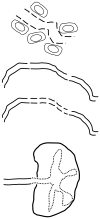The role of antibodies in transplantation
- PMID: 19628382
- PMCID: PMC2752491
- DOI: 10.1016/j.trre.2009.06.002
The role of antibodies in transplantation
Abstract
For the past 40 years, T cells have been considered the primary threat to the survival of allografts. However, antibodies can induce severe vascular disease of organ transplants, and this disease, particularly "antibody-mediated" rejection, has become a major clinical challenge. Not only do antibodies cause rejection, the rejection caused by antibodies resists treatment by conventional drug regimens. On the other hand, antibodies can induce a condition in which grafts seemingly resist antibody-mediated injury, which is accommodation. In this communication, we discuss the role of antibodies in the diagnosis and pathogenesis of rejection and accommodation, and suggest what we considered the major gaps in knowledge and directions research into this subject might productively take.
Conflict of interest statement
The authors declare no conflict of interest.
Figures


Similar articles
-
Xenotransplantation and ABO incompatible transplantation: the similarities they share.Transfus Apher Sci. 2006 Aug;35(1):45-58. doi: 10.1016/j.transci.2006.05.007. Epub 2006 Aug 14. Transfus Apher Sci. 2006. PMID: 16905361 Review.
-
[The role of humoral antibodies in the rejection of a kidney allograft (a review of the literature)].Vrach Delo. 1990 May;(5):45-9. Vrach Delo. 1990. PMID: 2204199 Review. Russian. No abstract available.
-
Specific intravenous carbohydrate therapy: a new approach to the inhibition of antibody-mediated rejection following ABO-incompatible allografting and discordant xenografting.Transplant Proc. 1993 Feb;25(1 Pt 1):377-8. Transplant Proc. 1993. PMID: 8438342 No abstract available.
-
ABO antibodies.Transplantation. 1994 Jun 27;57(12):1824. Transplantation. 1994. PMID: 8016891 No abstract available.
-
Relation between ABO blood type antigen and antibody and acute vascular rejection in ABO incompatible kidney transplantation.Transplant Proc. 1998 Nov;30(7):3507-9. doi: 10.1016/s0041-1345(98)01116-6. Transplant Proc. 1998. PMID: 9838538 No abstract available.
Cited by
-
ABO Incompatible Kidney Transplantation-Current Status and Uncertainties.J Transplant. 2011;2011:970421. doi: 10.1155/2011/970421. Epub 2011 Dec 10. J Transplant. 2011. PMID: 22174989 Free PMC article.
-
B cells with regulatory properties in transplantation tolerance.World J Transplant. 2015 Dec 24;5(4):196-208. doi: 10.5500/wjt.v5.i4.196. World J Transplant. 2015. PMID: 26722647 Free PMC article. Review.
-
Characteristics of Immunoglobulin M Type Antibodies of Different Origins from the Immunologic and Clinical Viewpoints and Their Application in Controlling Antibody-Mediated Allograft Rejection.Pathogens. 2020 Dec 23;10(1):4. doi: 10.3390/pathogens10010004. Pathogens. 2020. PMID: 33374617 Free PMC article. Review.
-
Recent Advances across the Spectrum of Heart Failure and Heart Transplant.J Clin Med. 2024 Mar 1;13(5):1427. doi: 10.3390/jcm13051427. J Clin Med. 2024. PMID: 38592320 Free PMC article.
-
Oral manifestations in transplant patients.Dent Res J (Isfahan). 2015 May-Jun;12(3):199-208. Dent Res J (Isfahan). 2015. PMID: 26005458 Free PMC article. Review.
References
-
- Medawar P. Tests by tissue culture methods on the nature of immunity transplanted skin. Quarterly Journal of Microscopial Science. 1948;s. 3–89:239–252. - PubMed
-
- Gorer PA. The antigenic basis of tumour transplantation. J Path Bact. 1938;47:231–252.
-
- Woodruff MFA, Allan TM. Blood groups and the homograft problem. Brit J Plast Surg. 1953;5:238–242. - PubMed
Publication types
MeSH terms
Substances
Grants and funding
LinkOut - more resources
Full Text Sources
Other Literature Sources
Miscellaneous

